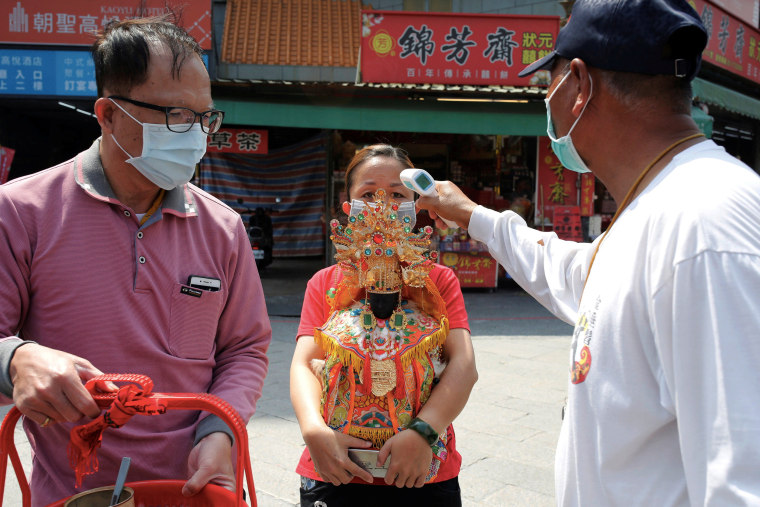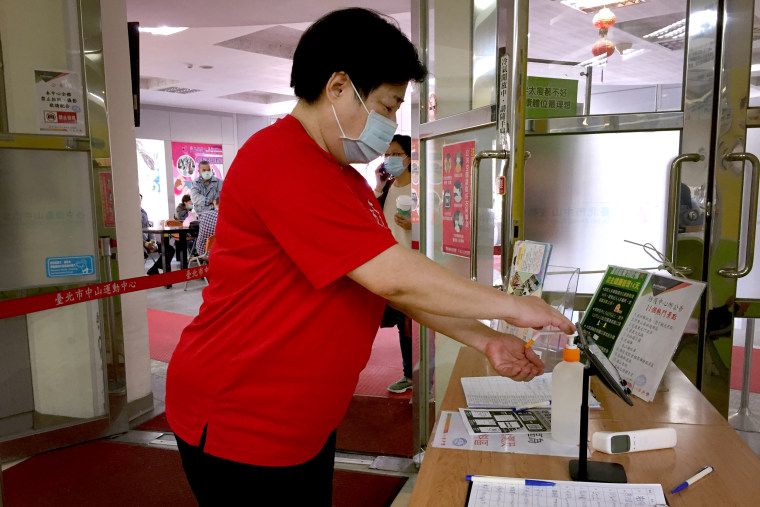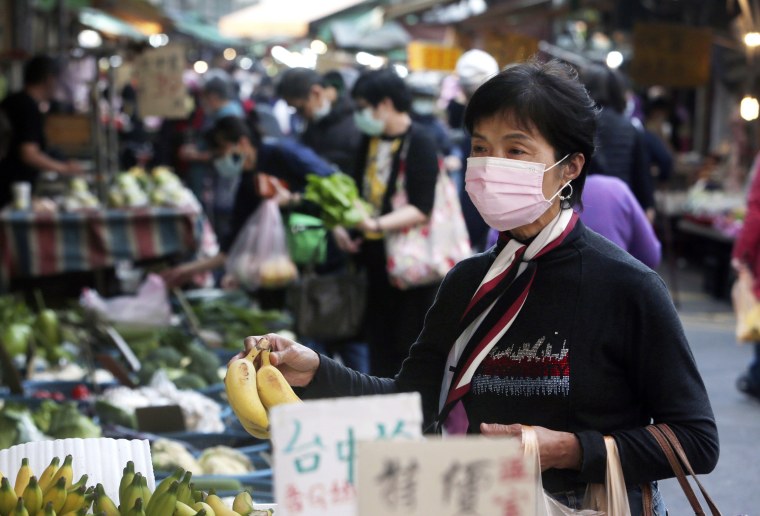
This article is more than
5 year old
TAIPEI — After the lockdowns, what next?
As various countries start to ease the restrictions on movement and commerce they imposed to stem the spread of COVID-19 — or at least think about lifting them — the questions loom:
How can the lockdowns be safely eased? Do governments have clear strategies for restarting their economies without risking a new surge in illness?
What, in short, will the new normal look like — at least in the near term?
One economy that managed to avoid a lockdown, and which has been functioning better than many others, is Taiwan's. The island appears to have emerged from the crisis relatively unscathed. It managed to keep its 11 million-strong labor force working and its economy running.
It has recorded only about 400 cases of coronavirus and six deaths even though it lies off the coast of China, where the outbreak was discovered, and even after it saw a recent spike in imported cases.
But with no vaccine in sight, Taiwan is taking no chances. And if its example is any guide, the new normal — life without a lockdown — won’t look much like the old normal at all.
Here’s how Taiwan does it.
For one thing, anyone arriving in Taiwan from overseas must have his or her temperature checked at the airport.
Arriving passengers must also hand over their mobile phones so health authorities can record the details and use the GPS signals provided by telecoms operators to track the phone’s owners — and make sure they stay isolated during 14 days of mandatory quarantine.
Police show up within minutes if the reception is poor or the phone runs out of battery. And a failure to answer the phone can prompt authorities to send text messages such as this: "Please return home immediately. Violations of home isolation/home quarantine regulations will result in fines and mandatory placement. The Central Epidemic Command Center cares about you."
Fines for violating the mandatory quarantine range from $3,333 to $333,333.
To reduce the chances of infecting others, arriving passengers are banned from taking public transportation and must instead use special “epidemic-prevention taxis” to get from the airport to their quarantine facility — or from there to a hospital, if they need to see a doctor.
The taxis look like ordinary cabs, but the drivers disinfect their vehicles after every trip and are not allowed to take other customers.
"Only a small number of drivers were willing to do this job," said Wang Yu-kai, a Taipei City transportation official. "We pay them $116 a day even if they don’t have any quarantine customers, so they won’t be tempted to get regular customers and risk infecting others if they catch the virus."
Full coverage of the coronavirus outbreak
After a month, the drivers themselves must go into quarantine for 14 days — and so, too, must their taxis.
"They must park the vehicle in a designated area and install GPS so we can see if the taxi is where it's supposed to be," Wang said. "It’s to protect everyone’s safety.”
And it’s not only airports. Authorities at many buildings — from post offices and banks to office towers and sports centers — check the temperatures of employees and visitors, preventing anyone with a fever from entering.
“Initially, some people complained that it was inconvenient, but we have no choice. We have to fight the epidemic,” said Jackie Liu, a manager at a sports complex in Taipei. "If we find anyone with a fever, we notify the government."

|
The complex also requires visitors to write down their names, phone numbers and the part of the facility they will be using — be it the gym or the yoga rooms — to expedite the tracing of contacts should an outbreak occur.
Schools ask parents to check students’ temperatures daily. Teachers check at the gate if students arrive not knowing their temperatures. Anyone with a fever must stay home and call a hospital.
Building security guards like Chan Wen-guang now must check the temperature of everyone walking in; he checks 100 to 150 people daily.
“Anyone with 37.5 degrees (99.5 degrees Fahrenheit) can’t work and must go to the doctor," Chan said. "Everyone is very cooperative; they come straight to my desk. I’m the most important gatekeeper."
Businesses with walk-in customers are eager to reopen. But to prevent infections and ensure that customers feel safe eating out again, Taiwan’s shops and eateries are sanitizing their facilities frequently and thoroughly.
Download the NBC News app for latest updates on the coronavirusoutbreak.
“Even before the epidemic, our staff wore masks and disinfected the tables at the end of the day,” said Chen Bo-wei, a Taiwanese restaurant manager. “But now we wipe the tables and other common areas, such as the bathrooms, whenever we have time."
Some restaurants like his have taped a big X on every other chair so that no one sits next to - or across from - anyone else.
Customers are advised to wash their hands and avoid talking to one another.
Business has fallen by 20 percent, Chen said. But the restaurant is receiving more takeout and delivery orders than before.
A sufficient supply of face masks and hand sanitizers will be needed if communities under lockdown are to reopen safely — and if people are to feel safe going out again, as Taiwan’s example shows.

|
At the entrance or lobby of almost every public or private building here, there’s at least one bottle of alcohol disinfectant spray or a hand sanitizer dispenser for people to use.
With many people taking mass transit, everyone must wear a mask when they take a subway, train or bus.
Even with cellphone tracking, someone needs to enforce quarantine guidelines. In Taiwan, local officials have been enlisted to help.

quarantine twice a day to make sure they are home and to check if they have symptoms.Courtesy Tseng Chiung-mei |
Taiwan's borough chiefs, the lowest level elected officials, now must call people quarantined in their jurisdiction twice a day to make sure they are not fooling authorities by leaving their tracked phone at home while they go out.
This turned out to be quite a headache for Tseng Chiung-mei, a Taipei borough chief who at one point had to check on more than 100 quarantined people.
"Each day my borough’s director and I were making endless phone calls," said Tseng, adding that many of those quarantined in her borough were single people with no family to help them.
“They would call me and ask me to help them buy a boxed meal, instant noodles or a thermometer, because they couldn’t go out,” Tseng said. "They also call us to help them take out their garbage, because their building’s janitor doesn't dare to. Some even say they’re very bored and call us to chat with them."
In Taiwan, social distancing guidelines are generally followed voluntarily.
That means keeping at least 1.5 meters apart indoors (about 5 feet) and one meter apart outdoors (about three and a quarter feet). Nonessential gatherings are limited to no more than 100 people indoors and 150 people outdoors.
This has prevented baseball games or other sports events from being played in front of fans, who must now watch on TV, but Taiwan’s baseball leagues still managed to open the season this month.
Since fans were not allowed, one stadium set up mannequins and cardboard cutouts of fans to boost the players’ morale.
But while similar measures have worked in Taiwan and other places, such as Hong Kong, not all countries or territories will be able to duplicate them, said Keiji Fukuda, a former World Health Organization disease expert who is now director of Hong Kong University’s School of Public Health.
“I think it’s hard to duplicate the entire package; it’s easier to duplicate parts of the package,” said Fukuda, who is American.

|
“Taiwan and Hong Kong are relatively smaller; they were both directly impacted by SARS and have experience, whereas the U.S. is a big country. You have very different cultures depending on whether you’re in New York City or South Dakota," he said. "Even now you can see in some places in the U.S., the response is to go and buy guns and to protest social distancing as an intrusion on their rights.”
“On some measures, like electronic monitoring, you’ll see a hard pushback. In other measures, like masks and sanitizers, you won’t get a hard pushback,” he said. “It’ll come down to the level of compliance.”
With no vaccine yet in sight, and with so many things unknown about the disease, Taiwanese people, such as Chan, the building security guard, believe it’s better to remain cautious. Chan worries that people in some countries considering lifting lockdowns might not be as compliant as the Taiwanese have been.
“Just look at face masks for example — many Americans and Europeans don’t wear them,” Chan said. “Some countries thinking about reopening still don’t seem to have a sense of crisis. We should all take extra precautionary measures.”